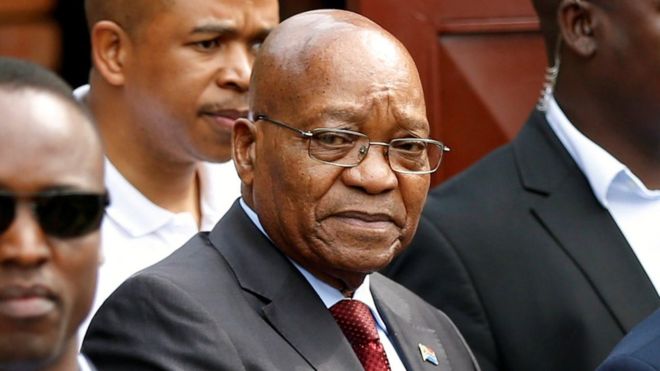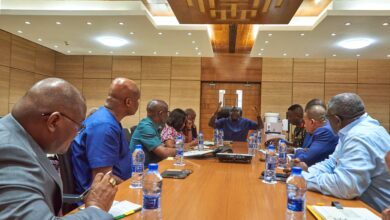
South Africa’s former President Jacob Zuma has been charged with corruption linked to a 1990s arms deal.
After the 75-year-old’s 15-minute appearance at the High Court in Durban on Friday morning, the case was adjourned until 8 June.
He faces 16 counts of corruption, racketeering, fraud and money laundering, which dogged his presidency and were reinstated in 2016.
His supporters descended on the city to rally for him, while his critics think court action is long overdue.
Mr Zuma smiled and gave a thumbs up to the crowd as he arrived at the court in his home province on Friday.
The BBC’s Andrew Harding said the former president appearing in a dock on corruption charges was “hugely symbolic” for South Africa’s young democracy.
Many, he reports, see it as an era of impunity coming to an end.
Mr Zuma and his legal team insist the charges are trumped up and politically motivated.
What was the arms deal?
Mr Zuma was deputy president at the time of the decades-old arms deal.
He is accused of accepting bribes from French arms firm Thales via his financial adviser at the time.
The adviser, Schabir Shaikh, was found guilty of trying to solicit the bribes and was jailed in 2005.
The case against Mr Zuma was dropped shortly before he ran for president in 2009.
The mood in Durban
By Pumza Fihlani, BBC News, Durban
Downtown Durban is a hive of activity – as the province’s beloved Jacob Zuma once again steps into the spotlight – once again courting controversy.
Some of the roads around the grand court building have been cordoned off, a large stage has been erected by Mr Zuma’s supporters a few metres from the courthouse – they are hoping he will use it to address them after the proceedings.
Meanwhile, hundreds of police officers are standing guard.
The last time Mr Zuma was in court for a trial was more than 10 years ago on rape charges – he denied the allegations and the case was later dropped. Back then, thousands came to support him including members of his own ANC party.
This time around the party led by the new president Cyril Ramaphosa is keen to distance itself from the controversy as the party prepares to contest the national elections in a year’s time. Mr Ramaphosa came in on a ticket of clean governance and his party cannot afford another scandal, but for the people here Mr Zuma remains a hero, a man who brought development to forgotten corners of this vast and largely rural province.
Mr Zuma’s opponents had long fought for him to be charged over the 1990s bribes.
The charges were reinstated in 2016 as his grip on the ruling party, the African National Congress (ANC), weakened.
Intense pressure from the ANC led to the former president resigning two months ago. He had been told to step down or face a vote of no-confidence in parliament.
Mr Zuma’s remaining supporters argue that he is being targeted for backing a radical economic reform agenda.
A battle is also brewing over whether the state should keep paying his legal bills.
Source: BBC

